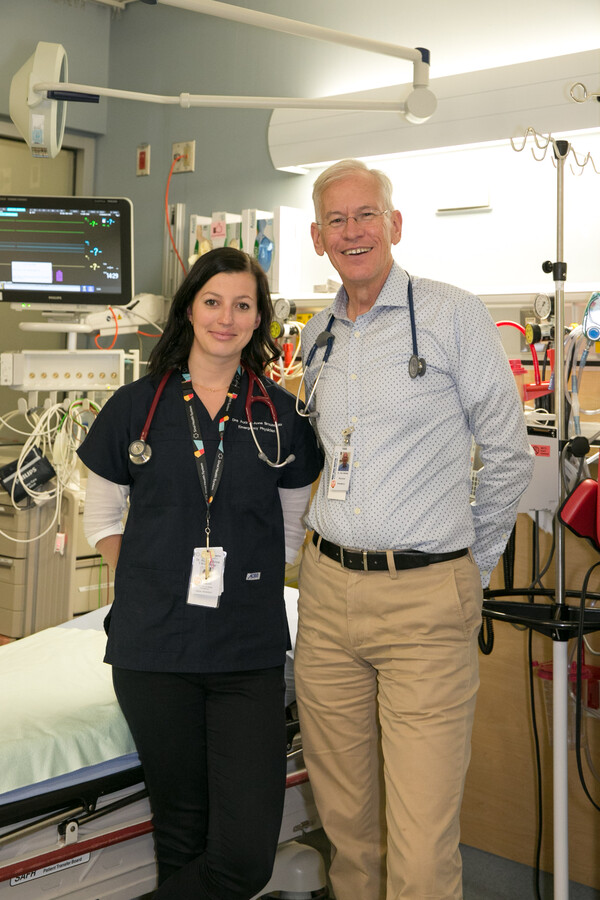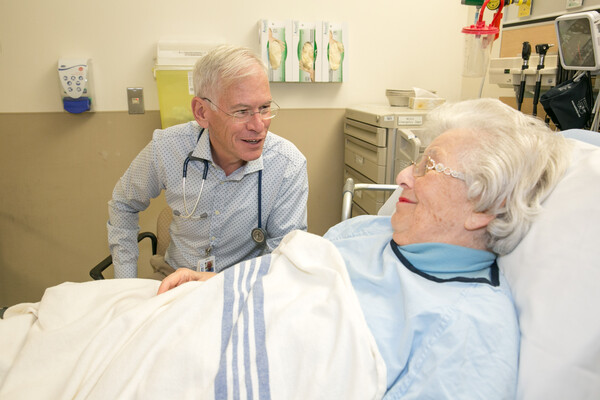Main Second Level Navigation
Breadcrumbs
- Home
- Education
- Geriatric Emergency Medicine Fellowship
Geriatric Emergency Medicine Fellowship

Outline:
This fellowship was active at Mount Sinai Hospital from 2015-2024. As of July 2024, it is no longer accepting applications. If you are interested in a similar fellowship, you should contact Dr. Alice Gray at the University Health Network, Toronto- division.em@utoronto.ca subject: Geriatric Emergency Medicine Fellowship
Some of the offerings that could be provided at the Sinai Health are:
Core rotations:
Geriatric Medicine Rotation: 2 -3 months
Active participation in the MSH/UHN Geriatric Medicine team including consulting to the Acute Care of the Elderly unit and in-patient and out-patient activities across all affiliated sites.
These rotations will also provide exposure to various outpatient clinics such as: Falls Clinic (at Toronto Rehab Institute or Bridgepoint); Comprehensive Geriatric Consult Clinic (MSH or Bridgepoint): Memory Clinic.
The focus of learning is:
- in-patient management beyond the ED;
- the multi-disciplinary team approach to patient care;
- familiarity with the functional and other assessment tools used by geriatricians;
- the importance of ethical and legal issues related to care of older patients;
- teaching opportunities for colleagues.
Geriatric Psychiatry (1-2 months)
Active participation with the Geriatric Psychiatry consult service (four psychiatrists, two nurse practitioners, one social worker) on the Geri-Psych consult team to assess the wide range of geriatric mental health presentations in the hospital as well as providing consult service to the ED. This block could also include outpatient clinics for assessment of community-dwelling older people with mental health diagnoses; and community visits with the Outreach team (seeing patients in home and in long-term care) for management of complex behavioral issues
The focus of learning is:
- Management – both pharmacologic and other -- of Behavioral and Psychological Symptoms of Dementia (BPSD)
- Assessment of complex and multi-factorial delirium; proposing investigation of cause and management of symptoms;
- Increasing comfort with strategies for establishing capacity and competence in both the community-dwelling and the hospitalized older person.
Geriatric Palliative Medicine (1 month)
This rotation will provide exposure to palliative care and symptom management which are complex and prevalent clinical issues in the ED. It will include some combination of in-patient and out-patient care through the Temmy Latner Centre for Palliative Care as well as the Palliative Care Unit based at Bridgepoint Hospital.
The focus of learning is:
- enhancing skills in pain and non-pain symptom management
- improving end-of-life care in the ED
- establishing goals of care,
- developing and altering care plans,
- interpreting advanced directives,
- addressing ethical issues at the end of life,
- capacity assessment
Geriatric Trauma (1 month)
Working with the Geriatric Medicine service that provides co-management to both the Geriatric Orthopedic Fracture Service and the Trauma Service.
The focus of learning is:
-
To gain comfort in management of multiple co-morbidities and post op complications in older patients;
-
To gain experience in the interface between the medical and surgical services provided to older patients admitted from the ED
Long-Term Care (1 month)
A significant proportion of older people seen in EDs live in Long-Term Care Homes. Familiarity with the particular issues of long-term care is essential. This rotation will provide the opportunity to work with the physician and nurse practitioner in a large LTCH to develop familiarity with difficult-to-manage cases in LTC and how the ED can interact. There will also be an opportunity to participate in the care of patients at numerous specialty clinics.
The focus of learning is:
- developing skills in complex medical management (polypharmacy, polymorbidity, delirium, dementia) at yet another point on the continuum of care;
- improving transitions of care between LTC and ED;
- ED avoidance strategies
Home-Based Primary Care Team (1 month)
This rotation will provide exposure to home-bound complex older patients living in the community. The fellow will work with the multi-disciplinary team.
The focus of learning is:
- Enhancing clinical assessment and management outside a hospital setting
- medication management, end-of-life care, complex medical care in the community;
- increasing familiarity with the network of services available in the community;
- increasing awareness of home safety and safety-for-discharge issues.
Geriatric Emergency Medicine (1-2 months)
The fellow will work in the Mount Sinai ED seeing patients only over the age of 75. The goal is to implement the learning from the other rotations and to take a different approach to care of older ED patients.
The focus of learning is:
- Increasing familiarity with models of care that specifically prioritise older ED patients;
- Enhancing comfort in working with the interdisciplinary geriatric assessment team;
- Identifying opportunities for Quality Improvement that benefit older patients
Geriatric Trauma (1 month)
Working with the Geriatric Medicine service that provides co-management to both the Geriatric Orthopedic Fracture Service and the Trauma Service.
The focus of learning is:
-
To gain comfort in management of multiple co-morbidities and post op complications in older patients;
-
To gain experience in the interface between the medical and surgical services provided to older patients admitted from the ED
Long-Term Care (1 month)
A significant proportion of older people seen in EDs live in Long-Term Care Homes. Familiarity with the particular issues of long-term care is essential. This rotation will provide the opportunity to work with the physician and nurse practitioner in a large LTCH to develop familiarity with difficult-to-manage cases in LTC and how the ED can interact. There will also be an opportunity to participate in the care of patients at numerous specialty clinics.
The focus of learning is:
- developing skills in complex medical management (polypharmacy, poly-morbidity, delirium, dementia) at yet another point on the continuum of care;
- improving transitions of care between LTC and ED;
- ED avoidance strategies
Home-Based Primary Care Team (1 month)
This rotation will provide exposure to home-bound complex older patients living in the community. The fellow will work with the multi-disciplinary team.
The focus of learning is:
- Enhancing clinical assessment and management outside a hospital setting
- medication management, end-of-life care, complex medical care in the community;
- increasing familiarity with the network of services available in the community;
- increasing awareness of home safety and safety-for-discharge issues.
Geriatric Emergency Medicine (1-2 months)
The fellow will work in the Mount Sinai ED seeing patients only over the age of 75. The goal is to implement the learning from the other rotations and to take a different approach to care of older ED patients.
The focus of learning is:
- Increasing familiarity with models of care that specifically priortise older ED patients;
- Enhancing comfort in working with the interdisciplinary geriatric assessment team;
- Identifying opportunities for Quality Improvement that benefit older patients

Non-clinical Activity
Research/Education/Creative professional activity (1-6 months)
- This will vary widely based on the particular needs and interests of the applicant.
- This could be block time or distributed over the year
- Completion of a research project and publication would be strongly encouraged
